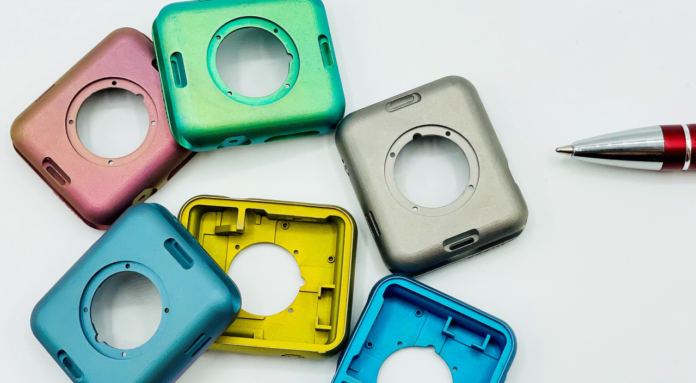Remember lithography-based metal manufacturing? The Additive Manufacturing process that turns 3D files into prototypes and small-scale production of components in MIM (metal injection molding) quality. So far, this manufacturing process is known as a production candidate for applications in the space and research industries.
The developer of this technology, Incus GmbH and Element22 GmbH, a developer and manufacturer of Titanium parts, have worked together on the production of personalized Smart Watch Housings made from Titanium6Al4V (Ti64).
Complexities at the manufacturing level
Incus 3D printed the parts, Element22 sintered and finished them. According to Incus, one of the advantages of LMM is that it can deliver parts typically around 13MPa in a 3-point-bending setup. The manufacturing process enables automated handling during extraction or de-powdering, and placement of the printed green parts onto the sintering setter.
However, processing Ti64 in binder- or sinter-based additive manufacturing (AM) processes, in such an application was quite a challenge. The material was made up of the binder and Metal Injection Molding (MIM) grade Ti64 powder at 55Vol% solids loading.
During debinding and sintering, the binder is thermally decomposed, leaving behind only the metal powder. A solids loading of 50Vol%+ is typically needed to achieve dense and mechanically functional parts, which sinters to the final solid materials with theoretical densities exceeding 99%. The LMM process yields a surface finish down to 2µm Ra (as-sintered) and a resolution of 35µm, Incus explains.
The first batch of smartwatch housings reveals how Ti64 delivers high tensile strength, corrosion resistance, and biocompatibility. The material’s ability to meet ASTM F2885-17 standards for medical implant applications, also makes it suitable for other applications in aerospace, defense, automotive, as well as oil and gas sectors.
In terms of production quantity, the HammerPro40 3D printer used for the production, could manufacture up to 16 watch cases in less than 2.5 hours. This means the annual production capacity can reach approximately 35,000 pieces – making this 3D printer an interesting production candidate for series production.
Gerald Mitteramskogler, CEO of Incus, asserts, “The HammerPro40 demonstrates our ability to match or even surpass the production economics of classical milling centers. Our LMM technology has proven its ability to match intended size and function without the need for extensive surface finishing or machining.” “With a fully customized smartwatch housing, we can achieve a competitive cost structure compared to traditional manufacturing technologies, especially when designs can no longer be realized with MIM or CNC,” he adds.
Remember, you can post job opportunities in the AM Industry on 3D ADEPT Media for free or look for a job via our job board. Make sure to follow us on our social networks and subscribe to our weekly newsletter: Facebook, Twitter, LinkedIn & Instagram ! If you want to be featured in the next issue of our digital magazine or if you hear a story that needs to be heard, make sure you send it to contact@3dadept.com


